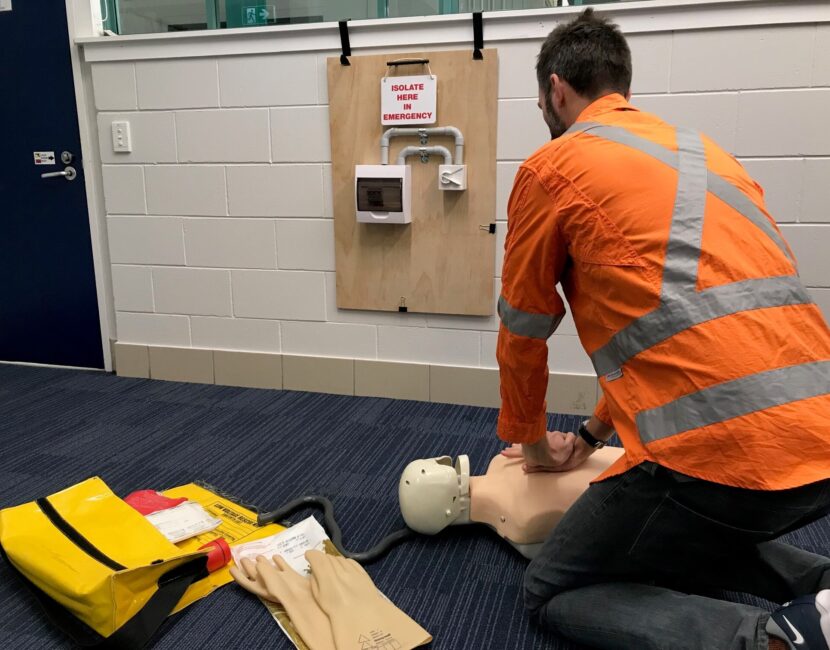Introduction
In a world where emergencies can take place anytime, the importance of first aid certification can not be overemphasized. Whether in your home, in the office, and even during leisure activities, having first aid abilities can save lives. This detailed guide on First Aid Accreditation: What You Need to Know Prior To Getting Started will certainly look into numerous aspects, including the types of training courses offered, the value of CPR training, and how mental health first aid plays an essential duty in today's society.
First Help Accreditation: What You Required to Know Before Getting Started
Before embarking on your trip in the direction of ending up being licensed in emergency treatment, it's vital to understand what certification entails. First aid certification is acknowledgment that you have actually undergone training to offer prompt help in medical emergencies. These programs usually cover essential subjects such as wound treatment, MOUTH-TO-MOUTH RESUSCITATION (Cardiopulmonary Resuscitation), choking relief, and more.
Why Get First Aid Certified?
Emergency Preparedness
Being planned for emergency situations ensures you prepare to act when needed.
Confidence Building
Certification enhances your self-esteem in handling crises effectively.
Career Innovation Opportunities
Many employers seek candidates with emergency treatment training as it demonstrates duty and readiness.
Community Impact
Being accredited enables you to add positively to your area by being a reliable source of help.
Legal Protection
Having official training can use some lawful protections under Do-gooder regulations when providing assistance.
Types of Emergency treatment Courses Available
Basic First Aid Training
Basic emergency treatment courses concentrate on basic skills essential for replying to common emergency situations like cuts, burns, and sprains. Participants find out how to evaluate scenarios and offer ideal treatment up until professional help arrives.
CPR Training
CPR training educates participants exactly how to execute cardiopulmonary resuscitation on individuals experiencing heart attack or other dangerous problems. It's an essential skill that substantially increases survival rates in emergencies.

Online Emergency treatment Courses
With the development of technology, numerous organizations currently supply online first aid courses. These adaptable choices allow people to find out at their very own pace while still obtaining quality education from trustworthy institutions.
Workplace First Aid Training
Workplace emergency treatment courses are tailored particularly for employees in numerous markets. They address prospective dangers connected with specific work roles and outfit participants with skills appropriate to their work environment.
Corporate Emergency treatment Training
Corporate first aid training is typically created for services wanting to make sure staff member safety within their organization. Commonly offered onsite or via partnered training centers, these programs promote a risk-free work culture.
Childcare Emergency treatment Course
For those working with children-- be it educators or day care carriers-- a childcare emergency treatment course is important. This customized training covers pediatric treatment methods and stresses child-specific emergency responses.
Mental Health and wellness First Aid
Mental wellness first aid has acquired prominence as awareness around mental health issues grows. This training course empowers people to recognize indicators of mental distress and offer preliminary assistance up until expert aid can be obtained.
Manual Handling Training
While not strictly a first aid training course, manual handling training is usually included as a result of its relevance in avoiding injuries within workplaces-- understanding correct training strategies contributes significantly towards overall safety standards.
What Does It Require to Obtain Certified?
Getting certified commonly entails enrolling in an identified program that satisfies specific criteria established by wellness basic first aid training courses authorities or organizations like the Red Cross or St. John Rescue. Here's what you typically require:
Course Registration: Enroll in a program that fits your schedule.
Training Sessions: Attend all needed classes (in-person or on-line) where you'll engage in theoretical understanding alongside sensible exercises.
Assessment: A lot of courses will certainly require passing an evaluation including both created tests and practical evaluations.
Certification Issuance: Upon effective completion of the course and evaluations, you'll get your certificate valid for a specified duration (typically two years).
Course Duration and Structure
The period of each course can differ substantially depending upon the kind:
- Basic Emergency treatment Training course: 4-8 hours CPR Training: 2-4 hours Online Courses: Self-paced (usually within 6 months) Workplace Specific Programs: 1-day workshops or multi-session formats
Most courses integrate classroom guideline with hands-on method; this double technique improves finding out retention.
Who Must Pursue Emergency treatment Certification?
While any individual can gain from coming to be licensed in emergency treatment, specific groups ought to prioritize it:
Teachers and Educators Parents and Caregivers Healthcare Workers Office Employees Sports Coaches Childcare ProvidersThese people run into situations where instant action might be called for; hence being well-prepared is essential.
Cost Variables Involved in Qualification Courses
When considering obtaining licensed, recognizing possible costs is important:
|Training course Type|Estimated Cost Range|| ----------------------------------|----------------------|| Fundamental First Aid|$50 - $150|| CPR Training|$30 - $100|| Online First Aid Courses|$20 - First aid training for schools $80|| Work Environment Details Programs|$100 - $500|| Corporate Trainings|Differs extensively|
Costs might include products like books or manuals; nevertheless, numerous establishments offer packed plans at affordable rates if you're enrolling multiple individuals from one organization.
How Commonly Must You Renew Your Certification?
Most qualifications require renewal every two years; this makes sure that your understanding stays existing with evolving methods and laws within the field of emergency response.
Some organizations could provide refresher courses which can also be advantageous as they help strengthen key concepts without needing a complete re-certification process every time.
FAQ Section
What are the prerequisites for taking an emergency treatment course?
Generally talking, there are no stringent requirements for basic emergency treatment courses; however, some innovative certifications could call for prior completion of lower-level training courses such as CPR training.
Do I need physical conditioning to carry out CPR?
Not always! While physical toughness can be beneficial throughout particular situations such as breast compressions-- trained strategies focus extra on correct kind as opposed to strength alone making it obtainable for everybody regardless of physical fitness level!

Can I get my certification online?
Absolutely! Numerous trusted organizations provide on-line modules enabling versatility within one's routine while preserving high academic standards through interactive content distribution methods!
Is mental health emergency treatment included in traditional courses?
Typically not! Mental health emergency treatment is normally used individually due its special focus area however can match basic physical health-focused trainings effectively if gone after together!
Will my company cover costs associated with obtaining certified?
Many employers identify the value added by having staff learnt life-saving skills-- they might compensate employees who choose these accreditations so long as they're relevant in the direction of boosting workplace safety and security initiatives!
How do I choose in between various accreditation providers?
Look out for accredited establishments acknowledged country wide-- they'll guarantee thorough educational program adherence together with experienced instructors providing top quality education!
Conclusion
In conclusion, going after qualification in emergency treatment is an indispensable investment not just directly but additionally properly-- and socially speaking! As emergencies emerge suddenly throughout our lives-- equipping ourselves through knowledge-based readiness ends up being vital towards safeguarding others along our trips together! By understanding what you need concerning certifications-- from types readily available down with renewal processes-- you'll discover on your own much better complete moving forward towards making meaningful impacts any place life leads you next!
Be positive today-- sign up into one of those popular programs now offered close-by or perhaps on-line-- to take the very important actions essential towards ending up being somebody qualified bridging spaces throughout times when help is absolutely needed most!
